Please switch to a modern browser (e.g. Google Chrome, Firefox or Microsoft Edge) in order to enjoy the best user experience.
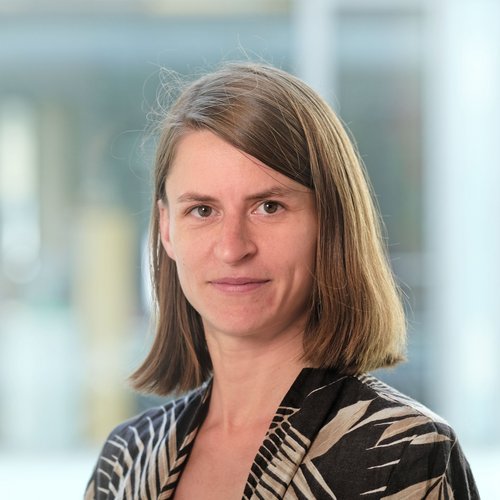
Economist for Social Security Systems and Income and Wealth Distribution
Tel: +49 221 4981-885 Mail: schueler@iwkoeln.de Ruth Maria SchülerResearch unit
Diermeier, Matthias / Schüler, Ruth Maria, 2023, Reform der Rentenversicherung in Deutschland. Eine Empirie zu Reformaversionen, in: IW-Trends, 50. Jg., Nr. 4, S. 45-60
Zur Studie
Schüler, Ruth Maria, 2023, Die Bedeutung von Wissen um die Alterssicherung für das Altersvorsorgeverhalten in Deutschland, in: IW-Trends, 50. Jg., Nr. 2, S. 77-95
Zur Studie
Schüler, Ruth Maria, 2023, Renteneintritt von Paaren in Deutschland, in: IW-Trends, 50. Jg., Nr. 1, S. 45-61
Zur Studie
Schüler, Ruth Maria / Diermeier, Matthias, 2023, Aufstieg und Fall von Industriestädten dies- und jenseits des Atlantiks, IW-Kurzbericht, Nr. 16, Köln
Zur Studie
Beznoska, Martin / von Haldenwang, Christian / Schüler, Ruth Maria, 2022, Steuervergünstigungen in den OECD-Ländern. Erkenntnisse aus der Global Tax Expenditures Database, IW-Report, Nr. 33, Berlin / Köln
Zur Studie
Schüler, Ruth Maria, 2022, Sorgen um die Altersversorgung in Deutschland. Determinanten und normative Implikationen, in: IW-Trends, 49. Jg., Nr. 1, S. 21-39
Zur Studie
(in cooperation with Wido Geis-Thöne)
Lebenslagen und Kompetenzentwicklung von Grundschulkindern
IW-Trends 2/2019
(in cooperation with Oliver Koppel)
Akademikerberufe – Nicht nur die Nachfrage bestimmt den Preis
IW-Kurzbericht 66/2018
(in cooperation with Christina Anger, Oliver Koppel, Axel Plünnecke, Enno Röben)
MINT-Fruhjahrsreport 2019 – MINT und Innovationen – Erfolge und Handlungsbedarfe
Gutachten für BDA, BDI, Mint Zukunft schaffen und Gesamtmetall, 2019
(in cooperation with Christina Anger, Oliver Koppel, Axel Plünnecke, Enno Röben)
MINT-Herbstreport 2018 – MINT: Qualifizierung und Zuwanderung zur Stärkung von Forschung und Digitalisierung
Gutachten für BDA, BDI, Mint Zukunft schaffen und Gesamtmetall, 2018
(in cooperation with Christina Anger, Axel Plünnecke)
Bildungsmonitor 2018 – Teilhabe, Wohlstand und Digitalisierung
Gutachten für die Initiative Neue Soziale Marktwirtschaft, 2018
Beznoska, Martin / Schüler, Ruth Maria, 2023, Tax expenditures in OECD countries. Findings from the Global Tax Expenditures Database, in: German Institute of Development and Sustainability (IDOS), Discussion Paper 7/2023, Berlin / Köln
Zur Studie
(in cooperation with Francesco Cinnirella)
Nation Building: The Role of Central Education Spending
Explorations in Economic History, Vol. 67, 2018, pp. 18–39
Education Economics from a Historical Perspective
ifo Beiträge zur Wirtschaftsforschung 78, 2018
Educational inputs and economic development in end-of-nineteenth-century Prussia
Ifo Working Paper, No. 227, 2016
Centralized Monitoring, Resistance, and Reform Outcomes: Evidence from School Inspections in Prussia
Ifo Working Paper, No. 223, 2016
(in cooperation with Francesco Cinnirella)
The Cost of Decentralization: Linguistic Polarization and the Provision of Education
CESifo Working Paper, No. 5894, 2016

As the German population ages, the country’s statutory pension scheme, which is financed on a pay-as-you-go basis, requires higher and higher contributions while the level of pensions is falling.
IW
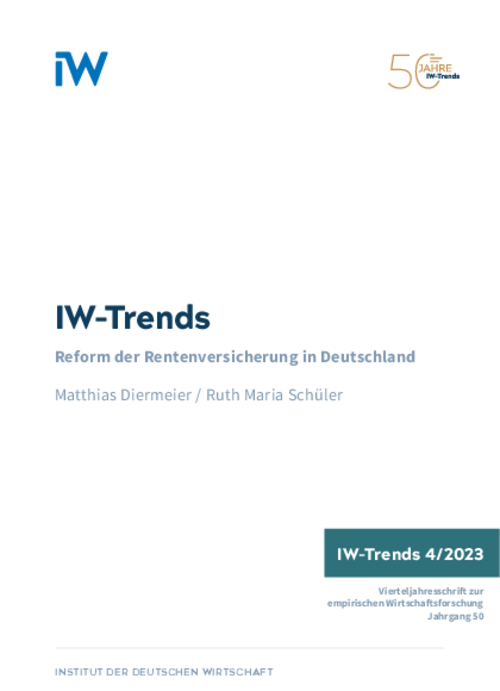
The demographic transition is putting the German statutory pension insurance system under enormous pressure to reform. Despite widespread concern, no reform of the adjustment mechanisms incorporated into the pension system meets with the approval of a majority of the population.
IW
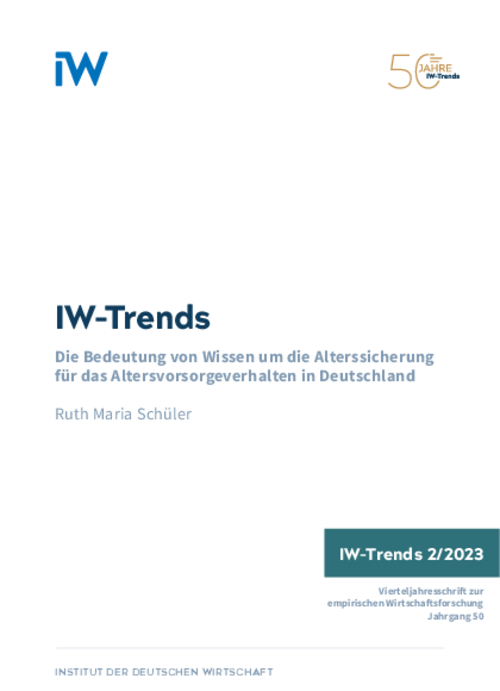
People in Germany have a relatively accurate knowledge of the main details of the German pension system.
IW
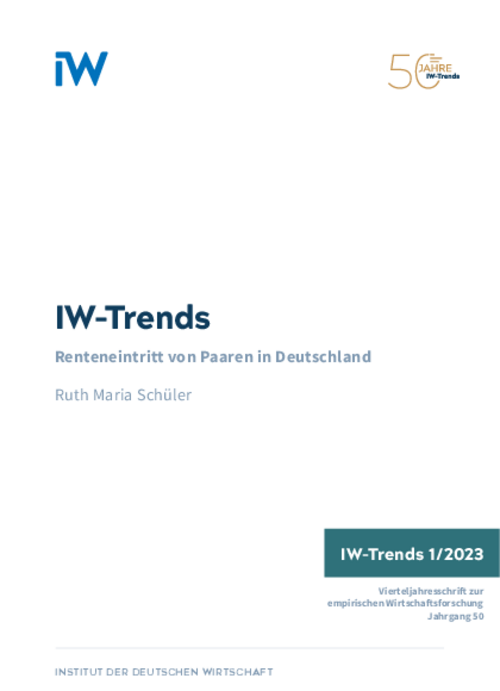
For the statutory pension scheme to be financed sustainably on its current pay-as-you-go basis, as many people as possible need to stay at work until the standard retirement age.
IW
The Global Tax Expenditures Database (https://GTED.net/) collects national reports on tax expenditures for 101 countries for the period from 1990 to the present. Based on these data, the development of tax expenditures in the 38 OECD countries between 1999 and today is examined.
IW
Buffalo (New York) and Dortmund (North Rhine Westphalia) as well as Akron (Ohio) and Chemnitz (Saxony) are twin cities that share the history of deindustrialization. At the same time, they experienced rapid population growth and a globalization shock in the middle and end (East Germany) of the twentieth century. The structural change in the Rust Belt was accompanied by economic upheavals, which is still reflected in today’s reluctance for electoral participation. In this respect, social security and regional policy have had a stabilizing effect in Germany.
IW
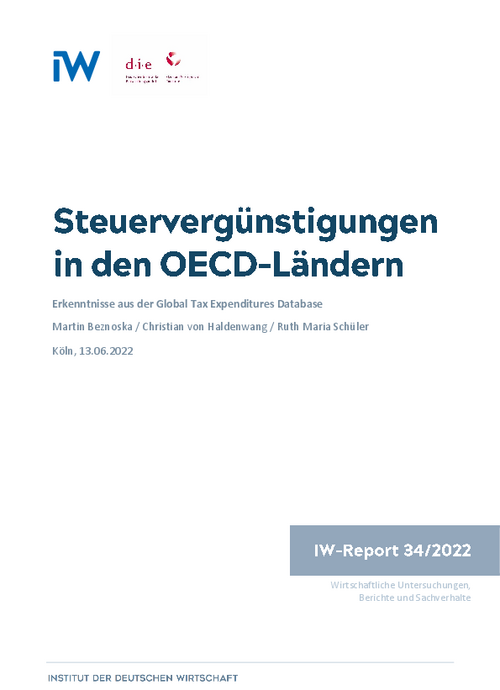
The Global Tax Expenditures Database (https://gted.net/) collects national reports on tax expenditures for 101 countries for the period from 1990 to the present.
IW
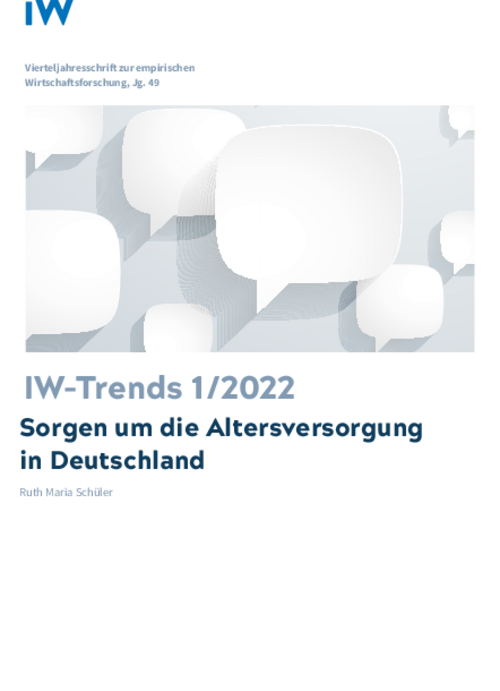
The level of statutory pensions for future generations is set to decline systematically. If future retirees are to maintain their standard of living, they will therefore need to supplement their statutory benefits with private and occupational pensions – a change already initiated with the pension reforms of the early 2000s.
IW
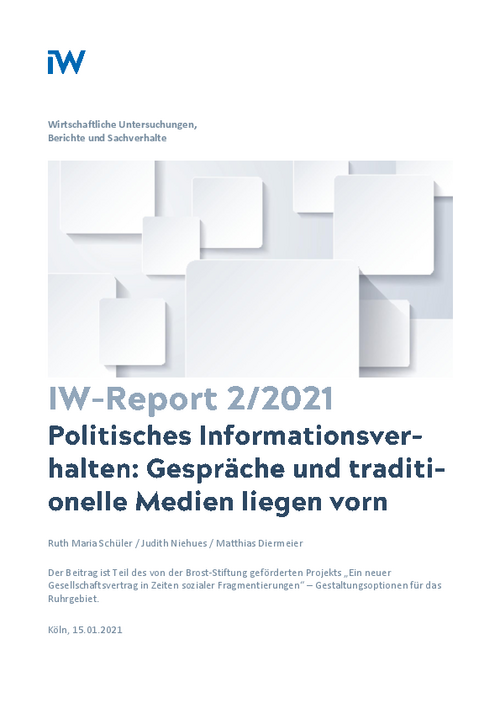
How Germans inform themselves about political events: Personal conversation and use of traditional media come first.
IW
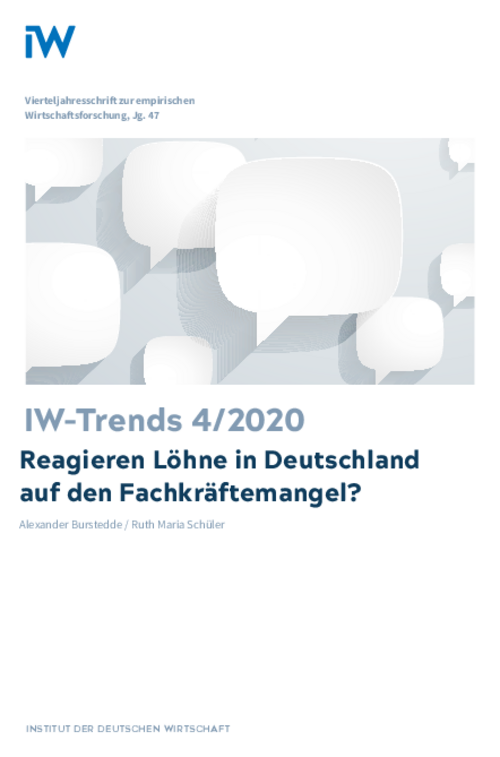
The demographic transition is confronting Germany with a growing shortage of skilled workers. In a simple, static labor market model, wages in occupations where the demand for labor is high should rise at an above-average rate to restore market equilibrium.
IW